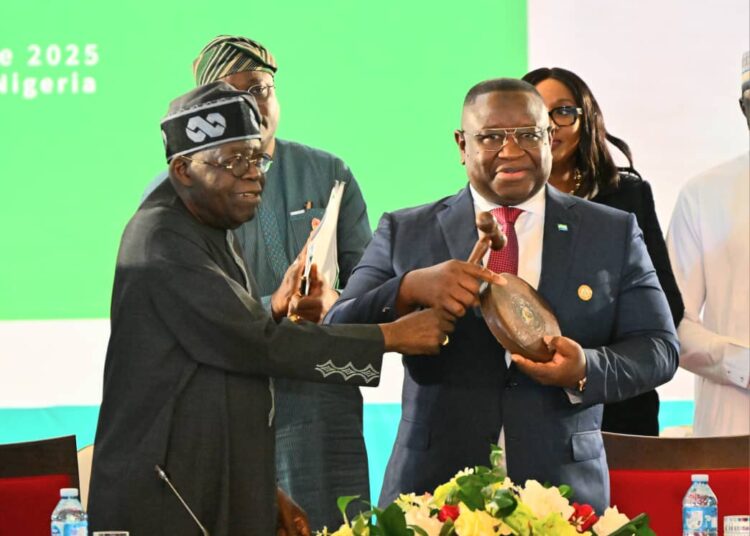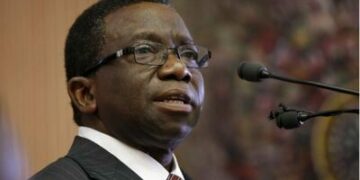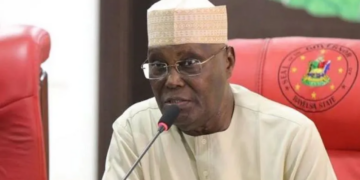The Economic Community of West African States (ECOWAS) entered a new chapter on Sunday as President Julius Maada Wonie Bio of Sierra Leone was elected chairman of the ECOWAS Authority of Heads of State and Government, succeeding Nigeria’s President Bola Tinubu, who served for two consecutive terms.
The leadership transition took place during the 67th Ordinary Session of the ECOWAS Authority held in Abuja, Nigeria—a gathering that also marked the 50th anniversary of the regional bloc.
The event brought together West African leaders to assess the state of regional integration, peace, and development.
In his welcome address, President Tinubu expressed concern over the region’s growing insecurity, warning that the slow pace in operationalising the ECOWAS Standby Force poses a threat to regional peace and stability.
“I am a little bit worried about the slow pace of its activation, which is taking longer than desired,” Tinubu said. “We must act decisively to operationalise the ECOWAS Standby Force in the fight against terrorism to serve as an instrument for peace and stability in our region.”
He stressed the transnational nature of violent extremism, illicit arms flow, and other crimes, saying that no single nation could tackle them alone.
Tinubu called for stronger coordination and political will, adding that Nigeria had taken concrete steps under his leadership, including the completion of the ECOWAS logistics depot in Lungi, Sierra Leone, and committing airlift and sealift support.
Beyond security, Tinubu urged regional leaders to prioritise economic integration, empower the youth and women, and fast-track infrastructure projects such as the Abidjan-Lagos Highway, the West African Power Pool, and the digital economy.
In his acceptance speech, President Maada Bio said he was “humbled and grateful” to chair the ECOWAS Authority, pledging to focus on restoring constitutional order, revitalising security cooperation, unlocking economic integration, and reforming ECOWAS institutions.
“Our region is at a crossroads,” Bio declared. “We face persistent insecurity, political instability, and a democratic space under strain. Citizens, especially our youth, are demanding not just elections but accountability, transparency and a fair stake in national life.”
Acknowledging his predecessor, Bio said, “President Tinubu’s tenure was marked by unwavering commitment to regional dialogue, economic recovery, and peacebuilding. I am humbled to build upon the strong foundation you have established.
Bio vowed to overhaul ECOWAS’s collective security framework—from intelligence-sharing to rapid response—while also turning trade liberalisation schemes and cross-border value chains into engines of job creation for women and youth.
He called for institutional reforms to rebuild public trust in the regional body, stating, “ECOWAS must become more transparent, efficient and responsive to the people’s needs.”
Also, speaking at the summit, the President of the ECOWAS Commission, Dr. Omar Alieu Touray, paid glowing tribute to the founding fathers of the community, singling out leaders such as Nigeria’s General Yakubu Gowon, Togo’s General Gnassingbé Eyadéma, and Côte d’Ivoire’s Félix Houphouët-Boigny for their vision in establishing ECOWAS in 1975.
“If we are celebrating the 50th anniversary of our community this year, we owe them a lot of gratitude,” Touray said.
He extended special appreciation to President Tinubu for his leadership over the past two years, as well as Nigeria’s Foreign Minister, Ambassador Yusuf Maitama Tuggar, and his team for their role in advancing ECOWAS’s integration agenda.
“Minister Tuggar’s leadership and the dedication of his team facilitated our work and helped move our agenda forward,” Touray said.
As the summit concluded, there was a renewed sense of urgency among regional leaders to confront the pressing challenges facing the bloc—from security threats and democratic erosion to economic stagnation and youth unemployment.
President Bio ended his speech with a rallying call: “Let us rise to the moment together, not as separate nations, but as a unified community of destiny. West Africa’s future is not one of decline, but of possibility—if we act with courage, unity, and moral clarity.”





